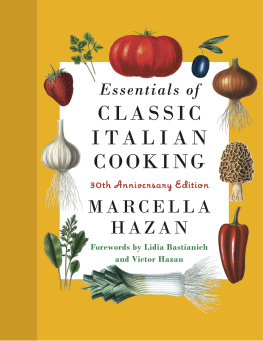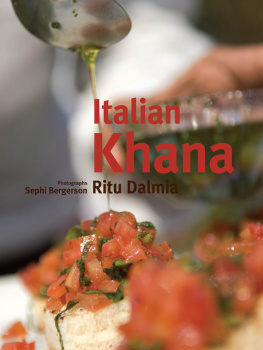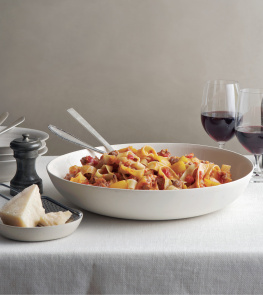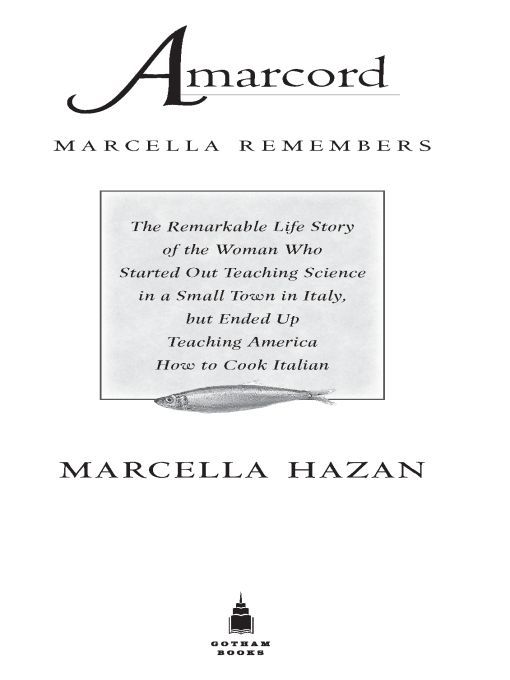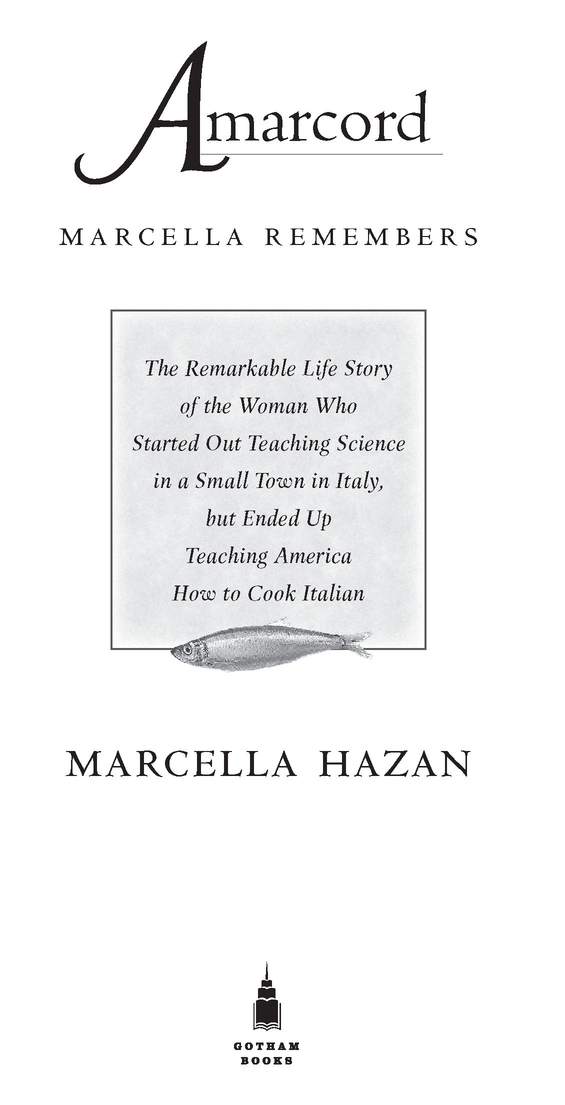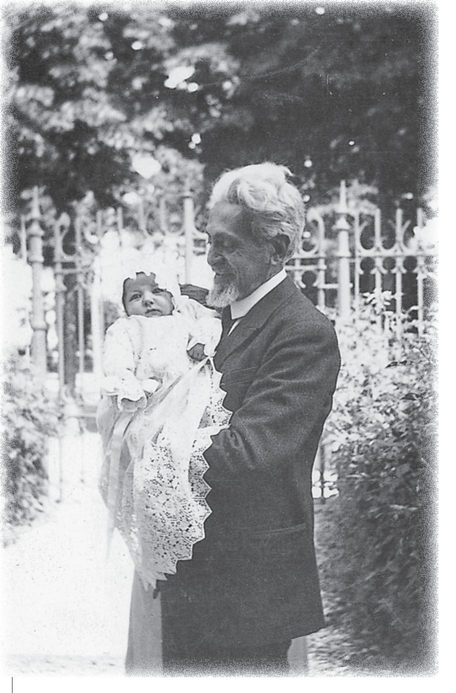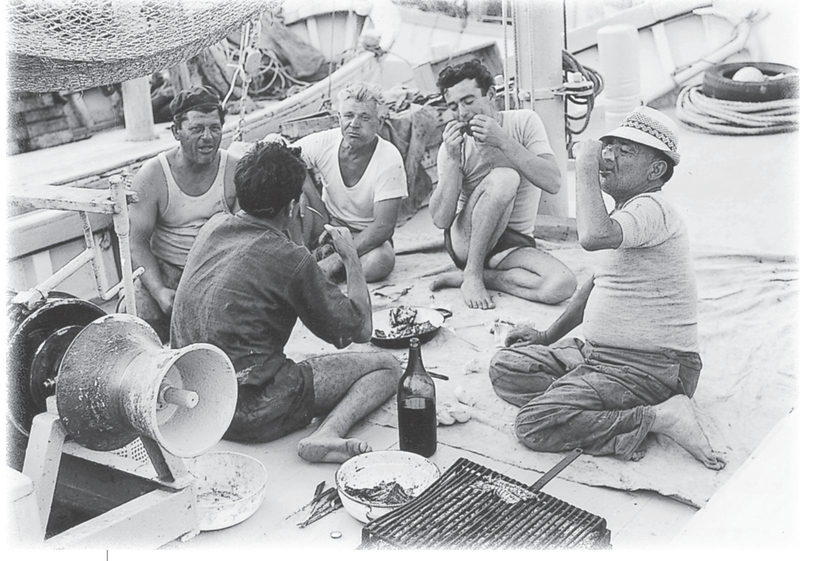Table of Contents
Romagna solatia, dolce paese...
Romagna, the sunlit, sweet land that the nineteenth-century poet Giovanni Pascoli described in his verses, is part of the northern Italian region known as Emilia-Romagna. If you travel southeast of Bologna, leaving Emilia and that hyphen behind, you come to a land of orchards, of cherries and peaches and pears, of old farm towns, of hills whose slopes are strung with vines bearing the purple clusters of the Sangiovese grape. Turn away from the hills and go due eastgo until there is sand in your shoesand you will gaze upon the Adriatic, a broad blue line stretching out to meet the sky. I ran on that beach, and swam in that sea; I ate the fruits of those orchards, and drank that purple wine. I am a daughter of that land; its heat warms my blood; all that I am started there; there I learned to play, to eat, to love. My lifes story begins in Romagna, and to Romagna I dedicate it.
Preface
LITTLE IS LEFT of the world I was born into eighty-four years ago. It as a world where most of the food on our tablevegetables and fruit, wine and olive oil, chickens and rabbitscame from our farm or from that of a neighbor or a relative. The sausages we grilled and the salami we sliced were made from a pig we had raised; our house linen was woven from the hemp we had grown; we would go to the pescheria, the fish market, to buy fish that had been caught that night; and we did not buy pasta from a grocer because my grandmotherusing a rolling pin nearly as long as she was tallrolled it out every day using our own eggs and flour. It was a world in which the most common form of personal transportation was the bicycle. Automobiles were so raremy father never owned onethat when Sandro, the richest man in town, roared down the road in his sports car, everyone ran out to look.
That old world of mine was in Romagna, the southeastern, sea-rimmed corner of Emilia-Romagna, a region in northern Italy. It has its own distinctive dialect, as every place in Italy does. In Romagnolo, the dialect of Romagna, amarcord means I remember, compressing the three slow-footed Italian words io mi ricordo into a single swift, emphatic one. Federico Fellini, the late great film director, who was also a native of Romagna, used Amarcord as the title of one of his finest films, an evocation of life as it was when he was young in Rimini, a town that my own Cesenatico closely resembles. His example came immediately to mind when I sought a title for this collection of my memories.
If you have lived as long as I have, when you open the door to the past, a vast hoard tumbles out in no particular order. The beam of memory does not necessarily sweep over life in strict chronological sequence. It may alight here on a person, there on a significant happening, without troubling to reconcile them or to plot them exactly on the graph of time. The characters and incidents that fill these pages were those caught in the random swings of memorys searchlight. If, during my tale, I digress or skip ahead or reverse course, it is not out of capriciousness. It is the way that one looks back on life.
In Nonno Riccardos arms, wearing my baptismal robe
Alexandria and Cesenatico
1931-1937
YOU COULD DESCRIBE the road my life has taken as a series of unexpected and even improbable turns. When I was seven years old, I fell on the beach and broke my right arm. It was a commonplace event, yet it set my life on the variable course that it has since traveled. AmarcordI remember. Some of it, indeed, I remember too well.
The beach I fell on was in Alexandria, Egypt, where my parents were then living. My mothers side of the family, the Leonelli, were expatriate Italians long settled in the Middle East. Maria, my mother, one of six children, including two pairs of twins, was born in Beirut. Riccardo, her father, was the general manager of a cigarette manufacturer, a circumstance that may have encouraged me, when in my teens, to form an attachment to tobacco that lasts to this day.
My father, Giuseppe Polini, was an accomplished tailor whose gifts had landed him excellent positions abroad, in Zurich, in Paris, and finally in New York. After five years in New York as the head cutter of B. Altmans mens custom department, he collected his savings and came back home to Cesenatico, a quiet fishing town on the northern Adriatic Sea, a 120-mile drive south of Venice along two old Roman roads, first on the Romea, then on the Adriatica.
It is a short stretch of coast that Cesenatico lies on, but it has forever been known for the exquisite flavor of the seafood that populates its waters. Maine has its lobster, the Sacramento River its chinook salmon, Cesenatico its sole. It is a small fish, less than half the size of a Dover sole, but its firm, sweetly nutty flesh earns it first place among soles of any provenance. The same sea also produces a less glamorous fish, a type of sprat, larger than an anchovy and smaller than a sardine, but with similarly dark and unctuous flesh. It is known only locally, and even there, it is too humble to put in an appearance outside the home kitchen. There is nothing humble about its flavor, however. Its scent, rising from the grill, and its flesh, dissolving under ones teeth, travel a direct line to ones deepest gustatory emotions. The name it goes by in Cesenatico and its neighboring towns in Romagna is saraghina. Devotees of Fellinis films may recall a wild, sensual woman by that same name, based on a character out of real life who used to roam the beach during Fellinis youth.
When Cesenaticos fishermen sail back home in the afternoon, having fished all night, they dock their boats along a canal designed by Leonardo da Vinci, which bisects the town and winds its way through it toward the sea. I remember waiting for the men to return and unload their catch. They were grizzled and hungry from the night spent working the sea. They set up grills over wood charcoal on the pavement of the quay where their boat was tied up, and on the hot embers, they grilled a mess of
saraghine. That is the moment I waited for, because the men always shared some of their
saraghine with me. I had quickly learned to eat them as they do. Holding the small fish by the tail and the head, I brought it to my mouth, pulled back my lips, and used my teeth to lift the entire tiny fillet off the
Back from a night of fishing, the crew snacks on grilled saraghine, eating them col bacio.
bone and suck it into my mouth. Then I turned the fish around and sucked away the fillet from the other side. Oh, the succulence of it!
Si mangiano col bacio, the fishermen say; you eat them with a kiss.
After the Second World War, Cesenatico grew to become one of Italys most popular beach resorts, but in the 1920s and 30s it was a sweet, simple village. There were two main parts to it. Well-to-do burghers from Bologna and other cities of the north summered in the pretty, art nouveau villas that, before they were eventually replaced by hotels, congregated in the shade of umbrella pines on the boulevards that run parallel to the beach. The fishermen and their families lived then, as many of them do now, in the center of town, in a huddle of modest one-story houses that face both sides of Leonardos canal.


